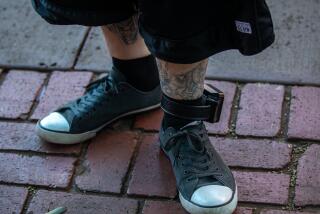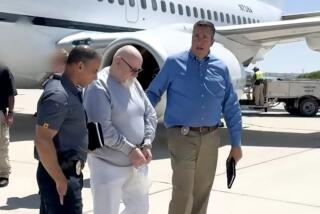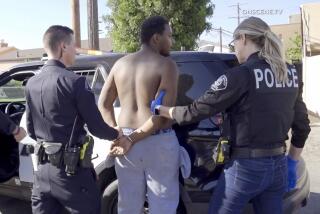Florida prosecutors reveal evidence against woman charged in ‘killer clown’ case

- Share via
After South Florida’s killer clown slipped away three decades ago, witnesses told investigators the culprit wearing white makeup and an orange wig looked like a man.
But it’s been revealed that evidence found in the getaway car — a strand of burgundy head hair with the root attached — is why authorities in 2017 unmasked the clown as a woman: Sheila Keen Warren.
In court documents filed this month, Palm Beach County prosecutors gave new insights into how they intended to use DNA evidence and other findings to win a conviction in the 1990 murder of Marlene Warren.
It’s long been known that the 40-year-old victim was shot at her front door in Wellington by a person wearing an orange wig, a red bulb nose, gloves and a painted-on smile.
Witnesses saw the assailant with “man-like features” clutching two balloons and flowers in one hand and a pistol in the other.
But in their “new statement of the case,” prosecutors explained why the 5-foot-8 Keen Warren, a thin woman with long hair, was the clown.
While alleging she had “masculine features” back then, they describe how she became an original person of interest because of her rumored affair with Michael Warren, husband of the dead woman. They point out that the lovebirds eventually married in 2002.
But the hard proof involves claims that Keen Warren was:
• Involved with the theft of a white Chrysler LeBaron, the suspected getaway car, before the murder.
• Seen buying the clown get-up two days before the killing.
• Found to own shoes with traces of orange wig fibers matching those found in the LeBaron.
• The DNA source of the human hair taken from the car.
Even though early detective work compiled much of the evidence against Keen Warren, charges were never filed, and the case went cold. Not until scientific advances in DNA technology would authorities take Keen Warren into custody near her home in southwest Virginia 27 years after the murder.
Early leads
Within about two hours of the May 26, 1990, shooting, the Palm Beach County Sheriff’s Office received an anonymous tip: “You might want to ask Michael Warren and Sheila Keen a few questions.”
The female caller’s message would foreshadow the focus of the Marlene Warren murder investigation in the days, weeks and months to come.
Michael Warren denied having any role. Detectives learned he was on his way to Calder Race Course in Miami Gardens with friends at the time his wife was shot at their home in the Aero Club community.
Keen said she was busy working as a “repo lady,” for Michael’s used-car lot, Bargain Motors, in West Palm Beach.
But detectives continued to look at both as suspects.
They discovered Michael and Sheila had been having an affair. They had clerks from a West Palm Beach costume shop pick Sheila out of a photo lineup as the woman who bought a clown costume two days before the slaying.
They also had Publix employees report that 90 minutes before the shooting a woman matching her description bought flowers and balloons like the kind the shooter left behind at the crime scene.
And perhaps the biggest discovery back then: Orange wig fibers found during a search of Keen’s apartment appeared quite similar to those found in the getaway car.
But prosecutors determined it wasn’t enough to file charges. Without DNA technology to solidly link Keen to the car via the hair strand, the evidence was boxed up for storage and the case languished for over two decades. The murder weapon and clown costume were never found.
Reopening a cold case
In 2014, the Sheriff’s Office received a $125,000 federal grant to reopen the investigation. A task force with members of the state attorney’s office and the FBI began re-interviewing witnesses.
They also learned that Michael Warren and Sheila Keen had a Las Vegas wedding several years after his release from prison on multiple charges of racketeering and odometer fraud. Authorities had examined his business dealings after his former wife’s murder.
Records show that, over a period of several months from late 2015 to early 2016, the FBI conducted new DNA testing and analyses of the hair and fibers in evidence.
In August 2017, prosecutors took their findings to a Palm Beach County grand jury, which returned an indictment of Sheila Keen Warren for the murder of Marlene Warren.
Without giving specifics, lead Detective Paige McCann then told reporters that the DNA results made all the difference. A person’s DNA is a unique genetic fingerprint, which can be lifted from surfaces and analyzed.
“In cold cases, we have a big puzzle,” McCann said. “A lot of it was already filled in by the thorough investigation done by the initial detectives, and we just needed a few little pieces of the puzzle. And we were able to do that with new technologies and DNA.”
Palm Beach County Sheriff Ric Bradshaw said the case wasn’t strong enough 30 years ago.
“There is one thing to think somebody did something, and it’s another thing to know somebody did it and be able to prove it in court,” Bradshaw said.
Michael Warren has been standing by his wife, who remains in the county jail without bond. He says he wonders what changed.
“How did they ever get enough fake bull— evidence to get a grand jury to indict on this?” he said to the South Florida Sun Sentinel last year. “They didn’t have no new evidence. It’s crazy.”
DNA link and arrest explained
But in a Nov. 6 filing, Assistant State Atty. Reid Scott mapped out the reasons for the murder charge:
• Keen knocked on the door of the Warren home at 10:45 a.m. “dressed as a clown” and holding a handgun. After the shooting, the clown drove away in the LeBaron; the victim died two days later from the bullet to the head.
• Witnesses inside the home at the time described the clown as having “man-like features.” But Scott pointed out, “At the time, Keen was a taller, thin white female with long brown hair and was described to have masculine features.”
• Michael Warren’s associates then told detectives he was having an affair with Keen, and the couple had been seen in romantic embraces. Questioned after the shooting, Keen denied being sexually involved with her boss.
• One of Warren’s employees, Claude Poitres, told investigators that, 45 days before the murder, he drove Warren and Keen to pick up a stolen white LeBaron and never to tell anyone about it. Keen told detectives she “had never been in a Chrysler LeBaron.”
• Two Publix clerks said they recalled a woman buying “the exact flower and balloon ensemble found at the scene.” These employees said their female customer had “male mannerisms.” The Publix was about one mile from Keen’s apartment. Keen denied shopping at the store.
• Detectives learned that a tall, thin white woman with long brown hair purchased a clown costume without shoes from Spotlight Costume in West Palm Beach two days before the murder. Detectives bought a wig identical to the one the woman paid for. The employees identified Keen as the woman in photo lineups.
• A witness to the shooting said the clown was wearing black lace-up shoes or boots, not clown shoes. Detectives were able to retrieve orange yellow acrylic hair fibers “consistent with a clown wig” on the ribbons of the Mylar balloons handed to the victim.
• A search of Keen’s home yielded two pairs of black lace-up shoes. Crime-scene technicians recovered orange yellow acrylic hair fibers and burgundy hair fibers from the bottoms of the shoes.
• Investigators found a white LeBaron abandoned in a Winn-Dixie parking lot four days after the shooting. They confirmed it was the same car that Poitres had observed Warren and Keen driving. Detectives collected hair fibers from the car’s carpet. “Specifically, the officers collected orange yellow acrylic hair fibers, as well as what appeared to be human hairs,” the prosecutor wrote.
• A “microscopic analysis” was conducted of the orange hairs found in the LeBaron, and those found on the shoes from Keen’s home, on the balloon ribbons and on the wig bought by the detectives. The analysis found the hairs were identical.
• An analysis of the burgundy hairs recovered from the shoes and the LeBaron “concluded that they were identical in comparison.” Further, a sample of Keen’s hair was identical to the human hair located in the LeBaron.
• The modern-day DNA analysis of the hair from the getaway car is what made the arrest possible. This examination determined that Keen Warren “could not be excluded” as the source of the hair. Moreover, a DNA analysis of “the skin portion of the hair root” concluded that it was from her head.
Keen Warren’s lawyers have not yet responded to the prosecutor’s DNA claims. Calling it as a case based on circumstantial evidence, lead counsel Richard Lubin has said his client is innocent and, “They’ve arrested the wrong person.”
Key witness for trial
As both sides prepare for a trial now scheduled for April, the state attorney’s office told a judge Wednesday that its most high-profile case was at risk of crumbling. They fear the COVID-19 pandemic could prevent the prosecution’s “most important witness” from testifying.
Prosecutors say their ability to win a conviction largely hinges on connecting Sheila Keen Warren, 57, to the hair and wig samples collected from the LeBaron.
For this reason, they want to make sure jurors can at least watch the recorded sworn testimony of a retired detective, Jay Mullins, who would verify he worked on retrieving the critical evidence.
Testimony from Mullins, who lives in Cincinnati, is “necessary to prevent the failure of justice,” argued prosecutor Scott. He said there was no other option because a second investigator who gathered the evidence, Michael Free, died three months ago in Lake Worth.
Prosecutors worry that continuing uncertainty about the virus and travel “creates a legitimate concern that the State’s most important witness may be rendered unavailable at time of trial,” Scott wrote.
Without Mullins on the stand, prosecutors “would face significant obstacles” in being able to place Warren in the car, the prosecutor explained.
So he asked for the court’s permission to get Mullins’ testimony on the record now — through a Zoom video recording — just in case he couldn’t make it to the trial.
“If, perish the thought, Mr. Mullins is unavailable due to illness or death, the perpetuation [of his testimony] was in fact, necessary,” Scott said. “If he is alive and able to testify, he will be present to testify.”
But Keen Warren’s lawyers slammed the idea about giving special treatment to Mullins, pointing out that every witness in every trial might not make it into court.
“Every person is at risk of death or incapacitation simply by living their life,” wrote attorneys Richard Lubin, Amy Morse and Greg Rosenfeld.
They argued Mullins could simply testify by Zoom during the actual trial if he couldn’t appear in person. Or he could be ordered by the court to show up whether he wanted to or not.
The defense counsel also said they weren’t ready to question Mullins yet because they were still waiting to examine the evidence that he’d testify about. That review has been on hold because of the pandemic.
Circuit Judge Joseph Marx sided with the defense, ruling the prosecution can’t jump ahead and get the investigator’s words on tape as an insurance policy. They will just have to wait for the trial.
More to Read
Sign up for Essential California
The most important California stories and recommendations in your inbox every morning.
You may occasionally receive promotional content from the Los Angeles Times.










